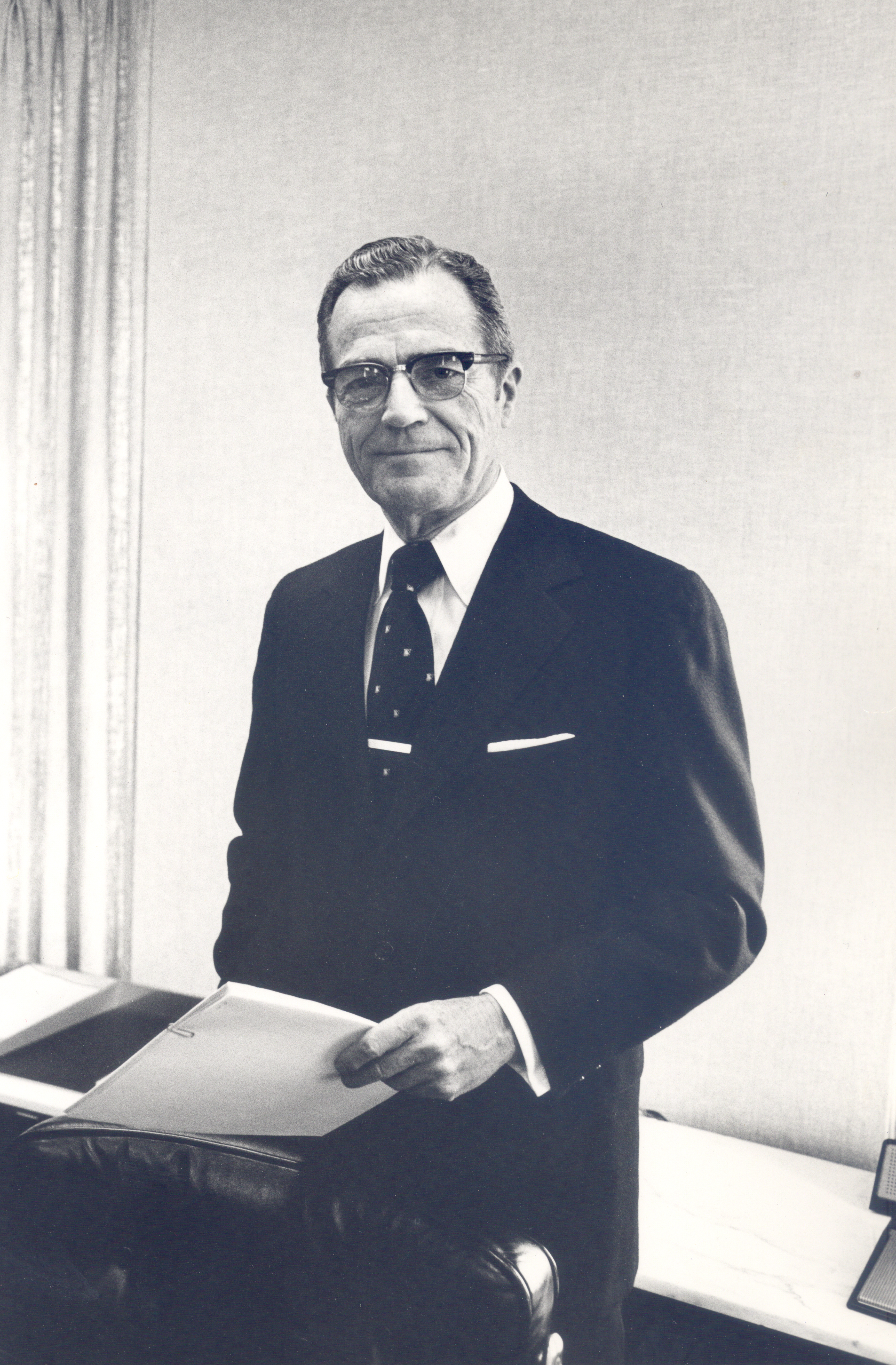Howard Sinclair Turner recently passed away after a short illness at Bryn Mawr Hospital at the age of 100. He was the last member of the founding Turner family to take the helm of the Turner Construction Co., one of the largest international construction management companies.
Turner Construction was founded in 1902 by Howard Turner’s uncle, Henry Chandlee Turner and quickly found its niche in the construction industry using the new material of reinforced concrete.
Born in Jenkintown, Pennsylvania in 1911, Howard Turner was the second of three sons of J. Archer Turner, Jr, who was President of the Turner Construction from 1941 to 1946. Howard graduated from Swarthmore College in 1933 and was subsequently elected an honorary member of Phi Beta Kappa. He completed a doctorate in organic chemistry and chemical engineering in 1936 from the Massachusetts Institute of Technology (MIT). He married Katharine (Kay) Swett, whom he met on a blind date, and they remained married until her death in 2003.
After graduating from MIT, Turner worked as a research chemist with the DuPont Corp. where he worked on novel uses, including for parachutes and food packaging, of a new synthetic material – nylon. He then joined Pittsburgh Consolidation Coal Co. in 1946 to lead their new research and development division. In 1954, Turner joined Jones & Laughlin Steel Co. as the vice president of research and development.
Turner joined the Board of Directors of Turner Construction in 1952. In 1965, he was selected to serve as President of Turner Construction. He served as President and Chief Executive Officer from 1968 to 1971. Turner served as Chairman of the Board from 1971 to 1978. From 1978 to 1982, he served as Chairman of the Executive Committee.
Under his leadership, the company grew from seven offices in the U.S. to operations in 20 cities; the company’s community affairs program was formalized and the Turner School of Construction Management for minorities and women was established; and the company’s international division was launched with operations in four countries. The company's sales grew from $591 million in 1965 to $1.7 billion by 1978.
Turner was also very active outside his responsibilities as the leader at Turner Construction. He served as a director of GAF, Teacher’s Insurance and Annuity Assoc., Ingersoll Rand, ASARCO, Dime Savings Bank of New York, and Jones and Laughlin. He was a trustee of the Wistar Research Institute, Swarthmore College, Rockefeller Institute, and Washington College. At the request of various administrations, he was a member of technical advisory committees for the Department of Commerce and the Post Office. Of note, he served on President Nixon’s Science Advisory Committee until it was dissolved when the members disagreed with the President in testimony before Congress. In 1966, he traveled with a delegation to Vietnam to develop a report on developing health, education, agriculture by President Johnson. He was elected to membership of the National Academy of Engineering in 1983, one of the proudest achievements of his remarkable career. Always quite humble about his scientific abilities, Turner’s view was that his greatest contribution was the ability to connect research with application.
Through the years of his marriage to Kay, they were inveterate travelers to Europe, Asia, Central and South America, and Australia. At the age of 82, he traveled to the North Pole on a nuclear-powered Russian ice breaker. He is survived by his three daughters, Susan Turner, a social worker of Boston, Holly Turner, a lawyer, (Don Carmichael) of Edmonton, Canada and Barbara Jean Turner, a physician-researcher, (Francisco Gonzalez-Scarano) of San Antonio, formerly of Wallingford and a Professor at the University of Pennsylvania, as well as seven grandchildren and four great grandchildren.
A Memorial Service after the manner of Friends will be held on Saturday, May 5th at noon at the Swarthmore Meeting House with a reception to follow. Donations in lieu of flowers can be made to the American Friends Service Committee or the Carter Center. BD+C
Related Stories
Adaptive Reuse | Sep 12, 2024
White paper on office-to-residential conversions released by IAPMO
IAPMO has published a new white paper titled “Adaptive Reuse: Converting Offices to Multi-Residential Family,” a comprehensive analysis of addressing housing shortages through the conversion of office spaces into residential units.
Mixed-Use | Sep 10, 2024
Centennial Yards, a $5 billion mixed-use development in downtown Atlanta, tops out its first residential tower
Centennial Yards Company has topped out The Mitchell, the first residential tower of Centennial Yards, a $5 billion mixed-use development in downtown Atlanta. Construction of the apartment building is expected to be complete by the middle of next year, with first move-ins slated for summer 2025.
Healthcare Facilities | Sep 9, 2024
Exploring the cutting edge of neuroscience facility design
BWBR Communications Specialist Amanda Fisher shares the unique considerations and challenges of designing neuroscience facilities.
Office Buildings | Sep 6, 2024
Fact sheet outlines benefits, challenges of thermal energy storage for commercial buildings
A U.S. Dept. of Energy document discusses the benefits and challenges of thermal energy storage for commercial buildings. The document explains how the various types of thermal energy storage technologies work, where their installation is most beneficial, and some practical considerations around installations.
Office Buildings | Sep 5, 2024
Office space downsizing trend appears to be past peak
The office downsizing trend may be past its peak, according to a CBRE survey of 225 companies with offices in the U.S., Canada, and Latin America. Just 37% of companies plan to shrink their office space this year compared to 57% last year, the survey found.
University Buildings | Sep 4, 2024
UC San Diego’s new Multidisciplinary Life Sciences Building will support research and teaching in both health and biological sciences
The University of California San Diego has approved plans for a new Multidisciplinary Life Sciences Building, with construction starting this fall. The 200,000-sf, six-level facility will be the first building on the UC San Diego campus to bridge health science research with biological science research and teaching.
Codes and Standards | Sep 3, 2024
Atlanta aims to crack down on blighted properties with new tax
A new Atlanta law is intended to crack down on absentee landlords including commercial property owners and clean up neglected properties. The “Blight Tax” allows city officials to put levies on blighted property owners up to 25 times higher than current millage rates.
Resiliency | Sep 3, 2024
Phius introduces retrofit standard for more resilient buildings
Phius recently released, REVIVE 2024, a retrofit standard for more resilient buildings. The standard focuses on resilience against grid outages by ensuring structures remain habitable for at least a week during extreme weather events.
Construction Costs | Sep 2, 2024
Construction material decreases level out, but some increases are expected to continue for the balance Q3 2024
The Q3 2024 Quarterly Construction Insights Report from Gordian examines the numerous variables that influence material pricing, including geography, global events and commodity volatility. Gordian and subject matter experts examine fluctuations in costs, their likely causes, and offer predictions about where pricing is likely to go from here. Here is a sampling of the report’s contents.
Adaptive Reuse | Aug 29, 2024
More than 1.2 billion sf of office space have strong potential for residential conversion
More than 1.2 billion sf of U.S. office space—14.8% of the nation’s total—have strong potential for conversion to residential use, according to real estate software and services firm Yardi. Yardi’s new Conversion Feasibility Index scores office buildings on their suitability for multifamily conversion.

















